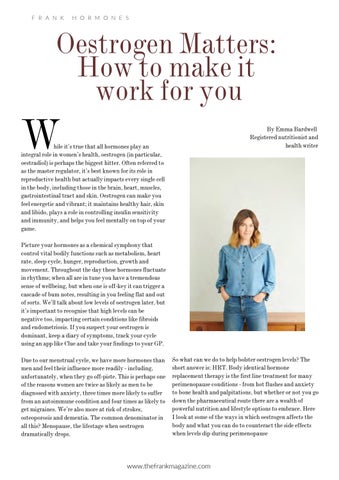F R A N K
H O R M O N E S
Oestrogen Matters: How to make it work for you
W
By Emma Bardwell Registered nutritionist and health writer
hile it’s true that all hormones play an integral role in women’s health, oestrogen (in particular, oestradiol) is perhaps the biggest hitter. Often referred to as the master regulator, it’s best known for its role in reproductive health but actually impacts every single cell in the body, including those in the brain, heart, muscles, gastrointestinal tract and skin. Oestrogen can make you feel energetic and vibrant; it maintains healthy hair, skin and libido, plays a role in controlling insulin sensitivity and immunity, and helps you feel mentally on top of your game. Picture your hormones as a chemical symphony that control vital bodily functions such as metabolism, heart rate, sleep cycle, hunger, reproduction, growth and movement. Throughout the day these hormones fluctuate in rhythms; when all are in tune you have a tremendous sense of wellbeing, but when one is off-key it can trigger a cascade of bum notes, resulting in you feeling flat and out of sorts. We’ll talk about low levels of oestrogen later, but it’s important to recognise that high levels can be negative too, impacting certain conditions like fibroids and endometriosis. If you suspect your oestrogen is dominant, keep a diary of symptoms, track your cycle using an app like Clue and take your findings to your GP. Due to our menstrual cycle, we have more hormones than men and feel their influence more readily - including, unfortunately, when they go off-piste. This is perhaps one of the reasons women are twice as likely as men to be diagnosed with anxiety, three times more likely to suffer from an autoimmune condition and four times as likely to get migraines. We’re also more at risk of strokes, osteoporosis and dementia. The common denominator in all this? Menopause, the lifestage when oestrogen dramatically drops.
So what can we do to help bolster oestrogen levels? The short answer is: HRT. Body identical hormone replacement therapy is the first line treatment for many perimenopause conditions - from hot flushes and anxiety to bone health and palpitations, but whether or not you go down the pharmaceutical route there are a wealth of powerful nutrition and lifestyle options to embrace. Here I look at some of the ways in which oestrogen affects the body and what you can do to counteract the side effects when levels dip during perimenopause
www.thefrankmagazine.com
